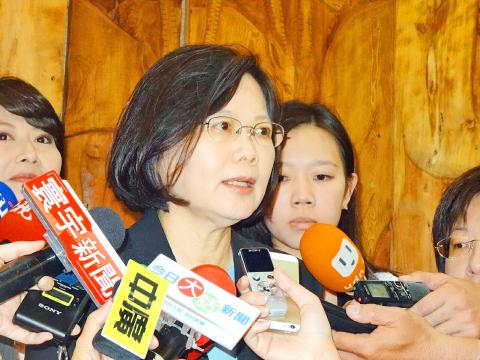Democratic Progressive Party Chairperson Tsai Ing-wen (蔡英文) yesterday declined to comment on New Taipei City Mayor and Chinese Nationalist Party (KMT) Chairman Eric Chu’s (朱立倫) announcement that he would not run in next year’s presidential election, saying that it is more important for the DPP to prepare well for the campaign.
“No matter who the KMT candidate is, the DPP will use the same degree of cautiousness in its approach to the presidential campaign, especially because the result of next year’s election will be the key to Taiwan’s development, and therefore we simply cannot afford to be relaxed,” Tsai said in response to reporters’ requests for comments on Chu’s remarks as she took part in a workshop on green energy in Tainan yesterday.
She said that although there might be conflicts, disputes and other complicated issues among politicians within the KMT, it is still a party with more than 100 years of history and a lot of resources.

Photo: Su Fang-ho, Taipei Times
Tsai added that as the KMT is yet to nominate a candidate, what the DPP can do now is to prepare itself to win the election, saying such efforts began as soon as she received her nomination from the DPP last week, and “will continue after we win the election.”
The green energy platform, for example, is one example of such efforts, she said.
The green energy platform was hosted by the DPP’s regional governance platform, which is headed by Kaohsiung Mayor Chen Chu (陳菊), and consists of DPP local government heads.
Asked about a running mate, Tsai said she is still undecided on the issue.
“It’s still too early to make the decision. I’ve neither chosen nor ruled out anyone,” Tsai said. “I might have to wait until later in the election campaign to make the decision. Of course I think about it from time to time, but I will not rush the decision.”
Speaking at the workshop, Tsai said the DPP would start to prepare for its potential role in central government at local government level, and once in power, she would coordinate local efforts to make Taiwan a better nation.
She said the purpose of the workshop was to discuss energy policies, adding that 2025 — the year which Tsai vowed to make Taiwan nuclear-free — is not far away.
Meanwhile, Tainan Mayor William Lai (賴清德) said Tsai’s frequent visits to southern Taiwan show her determination to bridge the gap between the north and south.
On the running mate issue, Lai said it is a DPP tradition to give the party’s presidential candidate full freedom to make the decision.
“Compared with 2012, Tsai has made a lot of progress. She is more confident, has a better understanding of key issues and is more passionate when facing the public,” Lai said.

CHANGING LANDSCAPE: Many of the part-time programs for educators were no longer needed, as many teachers obtain a graduate degree before joining the workforce, experts said Taiwanese universities this year canceled 86 programs, Ministry of Education data showed, with educators attributing the closures to the nation’s low birthrate as well as shifting trends. Fifty-three of the shuttered programs were part-time postgraduate degree programs, about 62 percent of the total, the most in the past five years, the data showed. National Taiwan Normal University (NTNU) discontinued the most part-time master’s programs, at 16: chemistry, life science, earth science, physics, fine arts, music, special education, health promotion and health education, educational psychology and counseling, education, design, Chinese as a second language, library and information sciences, mechatronics engineering, history, physical education

The Chinese military has boosted its capability to fight at a high tempo using the element of surprise and new technology, the Ministry of National Defense said in the Quadrennial Defense Review (QDR) published on Monday last week. The ministry highlighted Chinese People’s Liberation Army (PLA) developments showing significant changes in Beijing’s strategy for war on Taiwan. The PLA has made significant headway in building capabilities for all-weather, multi-domain intelligence, surveillance, operational control and a joint air-sea blockade against Taiwan’s lines of communication, it said. The PLA has also improved its capabilities in direct amphibious assault operations aimed at seizing strategically important beaches,

‘MALIGN PURPOSE’: Governments around the world conduct espionage operations, but China’s is different, as its ultimate goal is annexation, a think tank head said Taiwan is facing a growing existential threat from its own people spying for China, experts said, as the government seeks to toughen measures to stop Beijing’s infiltration efforts and deter Taiwanese turncoats. While Beijing and Taipei have been spying on each other for years, experts said that espionage posed a bigger threat to Taiwan due to the risk of a Chinese attack. Taiwan’s intelligence agency said China used “diverse channels and tactics” to infiltrate the nation’s military, government agencies and pro-China organizations. The main targets were retired and active members of the military, persuaded by money, blackmail or pro-China ideology to steal

The High Prosecutors’ Office yesterday withdrew an appeal against the acquittal of a former bank manager 22 years after his death, marking Taiwan’s first instance of prosecutors rendering posthumous justice to a wrongfully convicted defendant. Chu Ching-en (諸慶恩) — formerly a manager at the Taipei branch of BNP Paribas — was in 1999 accused by Weng Mao-chung (翁茂鍾), then-president of Chia Her Industrial Co, of forging a request for a fixed deposit of US$10 million by I-Hwa Industrial Co, a subsidiary of Chia Her, which was used as collateral. Chu was ruled not guilty in the first trial, but was found guilty